仁爱英语七年级下册U5知识点汇总
仁爱七年级下册 unit 5 必考知识点
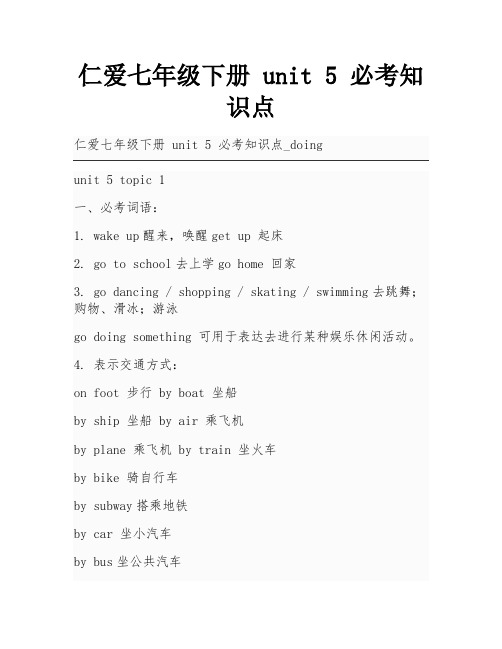
仁爱七年级下册 unit 5 必考知识点unit 5 topic 1一、必考词语:1. wake up醒来,唤醒get up 起床2. go to school去上学go home 回家3. go dancing / shopping / skating / swimming去跳舞;购物、滑冰;游泳go doing something 可用于表达去进行某种娱乐休闲活动。
4. 表示交通方式:on foot 步行 by boat 坐船by ship 坐船 by air 乘飞机by plane 乘飞机 by train 坐火车by bike 骑自行车by subway搭乘地铁by car 坐小汽车by bus坐公共汽车5. take the subway / bus / car搭乘地铁;公共汽车;小汽车6. drive a car to work = go to work by car驾车去上班take a bus to work = go to work by bus 乘公共汽车去上班go to school on foot = walk to school步行去上学7. ride a bike / horse骑自行车;骑马8. after school / class放学以后;下课以后9. play the piano / guitar/ violin弹钢琴;吉他;小提琴play basketball / soccer / football 打篮球;踢足球;打橄榄球play puter games玩电脑游戏play with a puter 玩电脑 play sports 做运动10. next to紧挨着,在…旁边11. on weekdays在工作日 at weekends在周末12. have breakfast / lunch / supper / dinner / meals 吃早餐;中餐;晚餐;正餐;一日三餐have classes / lessons / a meeting上课;上课;开会13. watch tv / movies / games / the animals看电视;电影;比赛;动物read novels / newspapers / books看小说;报纸;书14. wash one’s face / clothes洗脸;衣服15. 反义词:up – down, early – late近义词:quickly– fastget up early 早起 be late for 迟到16 表示建筑物(尤其学校建筑物):on the playground在操场 at school / home / table学校;家里;桌旁in a puter room / teachers’ office / classroombuilding / gym / library / lab / canteen在电脑室;教师办公室;教学楼;体操馆;图书馆;实验室;食堂17. around six o’clock = at about six o’clock大约在六点18. 频率副词:never, seldom, sometimes, often, usually, always重点详解1.i always e to school by bus.by+交通工具名称,表示使用某种交通方式,中间不加限定词,如果交通工具前有a, the, my 等限定词,就不能用by,而是用in或是on.on the train=by train on his bike=by bike in my car=by car.巧辩异同on foot 与 walkon foot “走路”,是介词短语,不能作谓语,只作方式状语,位于句末。
七年级下册仁爱英语Unit5知识点总结
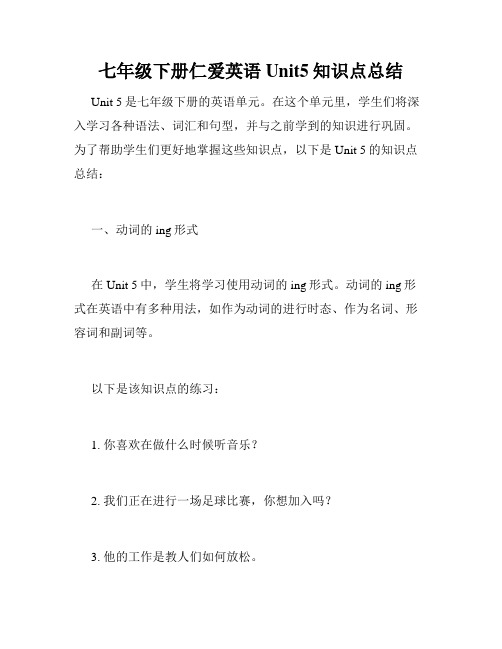
七年级下册仁爱英语Unit5知识点总结Unit 5是七年级下册的英语单元。
在这个单元里,学生们将深入学习各种语法、词汇和句型,并与之前学到的知识进行巩固。
为了帮助学生们更好地掌握这些知识点,以下是Unit 5的知识点总结:一、动词的ing形式在Unit 5中,学生将学习使用动词的ing形式。
动词的ing形式在英语中有多种用法,如作为动词的进行时态、作为名词、形容词和副词等。
以下是该知识点的练习:1. 你喜欢在做什么时候听音乐?2. 我们正在进行一场足球比赛,你想加入吗?3. 他的工作是教人们如何放松。
二、形容词的比较级和最高级形容词的比较级和最高级是英语衡量大小的常见方式。
当比较两个或多个事物的大小、数量或程度时,我们可以使用比较级或最高级。
以下是该知识点的练习:1. 哪个城市比你住的城市更大?2. 你喜欢什么颜色的衣服?3. 她的英语比我好一些。
三、名词单复数在Unit 5中,学生将学习名词的单复数形式。
在英语中,名词单复数的变化规则很多,如在单数名词后加s或es,在某些名词后加ies,或只是在词尾加一个s等。
以下是该知识点的练习:1. 我喜欢吃苹果和橙子。
2. 她有两只小狗。
3. 有些动物从不会变老,比如鲨鱼。
四、祈使句祈使句是一种命令句,用于向他人发出请求、建议或指示。
在祈使句中,动词不需要主语。
以下是该知识点的练习:1. 给我一支笔。
2. 不要在教室里跑步。
3. 拿一个椅子。
五、限定词在英语中,限定词用于在名词前表示数量、身份、归属等信息。
在Unit 5中,学生将学习使用不同的限定词,如冠词、数词、所有格等。
以下是该知识点的练习:1. 我有两本好书。
2. 这是我的学生证。
3. 请把这本书还给我。
总结在Unit 5中,学生将学习使用动词的ing形式、形容词的比较级和最高级、名词单复数、祈使句以及限定词等知识点。
通过充分理解和练习这些知识点,学生将能够更好地运用英语,为未来的学习和生活做好准备。
仁爱英语七年级下册知识点总结Unit5
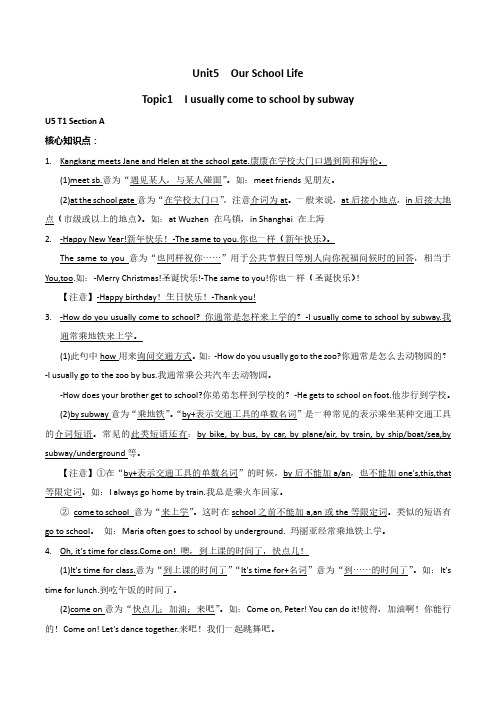
Unit5 Our School LifeTopic1 I usually come to school by subwayU5 T1 Section A核心知识点:1.Kangkang meets Jane and Helen at the school gate.康康在学校大门口遇到简和海伦。
(1)meet sb.意为“遇见某人,与某人碰面”。
如:meet friends见朋友。
(2)at the school gate意为“在学校大门口”,注意介词为at。
一般来说,at后接小地点,in后接大地点(市级或以上的地点)。
如:at Wuzhen 在乌镇,in Shanghai 在上海2.-Happy New Year!新年快乐!-The same to you.你也一样(新年快乐)。
The same to you意为“也同样祝你……”用于公共节假日等别人向你祝福问候时的回答,相当于You,too.如:-Merry Christmas!圣诞快乐!-The same to you!你也一样(圣诞快乐)!【注意】-Happy birthday!生日快乐!-Thank you!3.-How do you usually come to school? 你通常是怎样来上学的?-I usually come to school by subway.我通常乘地铁来上学。
(1)此句中how用来询问交通方式。
如:-How do you usually go to the zoo?你通常是怎么去动物园的?-I usually go to the zoo by bus.我通常乘公共汽车去动物园。
-How does your brother get to school?你弟弟怎样到学校的?-He gets to school on foot.他步行到学校。
(2)by subway意为“乘地铁”。
“by+表示交通工具的单数名词”是一种常见的表示乘坐某种交通工具的介词短语。
仁爱七年级下册英语u5知识点

仁爱七年级下册英语u5知识点Unit 5主要学习了“Can you come to my party?”一课,以下是本课的重点内容。
一、语法知识1. Can的用法表示“能,会”的意思,常用于一般疑问句、否定疑问句、肯定回答和否定回答。
例如:Can he swim? 他会游泳吗?Can’t you come to my party? 你不能来我的聚会吗?Yes, I can. / No, I can’t. 是的,我能来。
/ 不,我不能来。
2. 反意疑问句反意疑问句的结构为主句,助动词+not+主语,疑问句用肯定或否定形式。
例如:You can come to my party, can’t you? 你能来我的聚会,对吗?3. 疑问词的用法疑问词常见的有what, when, where, who, why, how等,用于提问。
例如:What time is the party? 聚会什么时候举行?When are you leaving for the party? 你什么时候去参加聚会?4. 一般将来时一般将来时表示将来会发生的动作或存在的状态,常用will / won’t + 动词原形。
例如:I will go to the party. 我会去参加聚会。
She won’t come to the party. 她不会来参加聚会。
二、词汇知识1. party 聚会2. invitation 邀请3. present 礼物4. celebrate 庆祝5. birthday 生日6. holiday 假期7. weekend 周末8. vacation 假期三、阅读技巧1. 阅读全文首先阅读全文,捕捉重点信息,确定文章主题。
2. 理解重要段落找出文章中的关键段落,理解段落中的细节、事实和人物。
3. 抓住关键词抓住文章中的关键词,可涉及具体情节、人物、时间和地点等。
四、听力技巧1. 提前预测在听力开始前,可以预测听到的主题和话题,加深对话题的理解。
仁爱英语七年级下册Unit5课本重点总结

仁爱英语七年级下册Unit5课本重点总结Unit 5 Topic1重点知识复总结1.---Happy New Year!---The same to you.Happy birthday!---Thank you.2.Your new bike looks very nice!It looks nice on you.(这两句均为系表结构)3.I usually come to school by subway。
(提问)How do you usually come to school?Do you often come to school by bike?Yes。
I do.4.You mean you usually come to school by underground?此处mean为动词“意思是…”常见句型:What do you mean?你什么意思?meaningn.意思XXX.5.You’re right。
/ That’s right.承认对方说法。
That’s all right.不消谢。
6.It's time for class。
= It’s time to have classes.7.He comes to school on foot.= He walks to school.She goes to school by bus.= She takes a bus to school.XXX.XXX.8.Kankang meets Jane at the school gate.XXX foot步行(此类均为介词短语)10.I usually get up at about six o’clock on weekdays。
(提问)What time do you usually get up on weekdays?11.The early bird catches the worm.12.XXX XXX to school.He sometimes takes the train to Xinxiang.He often comes on foot.Sally usually takes a plane to the USA.Lucy always takes a bus to Xinxiang.13.Classes begin at eight。
仁爱版七年级英语下册unit5知识点
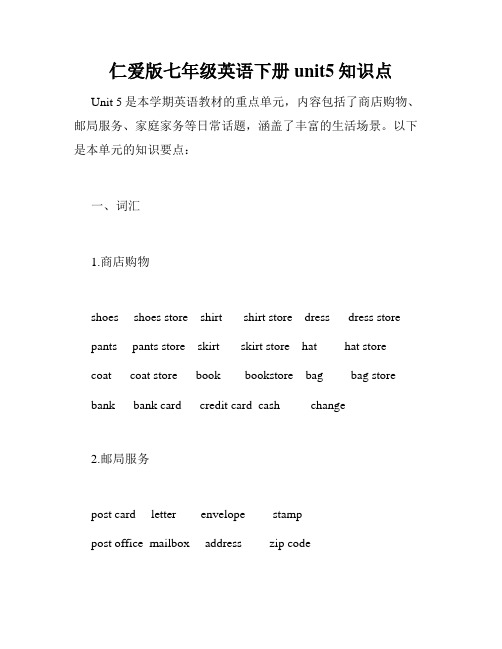
仁爱版七年级英语下册unit5知识点Unit 5是本学期英语教材的重点单元,内容包括了商店购物、邮局服务、家庭家务等日常话题,涵盖了丰富的生活场景。
以下是本单元的知识要点:一、词汇1.商店购物shoes shoes store shirt shirt store dress dress storepants pants store skirt skirt store hat hat storecoat coat store book bookstore bag bag storebank bank card credit card cash change2.邮局服务post card letter envelope stamppost office mailbox address zip code3.家庭家务clean clean up sweep mopwash laundry fold drydish do the dishes set the table clear the table二、重点语法本单元的语法重点是一般现在时和there be句型的运用。
1.一般现在时一般现在时通常用来表示反复发生的动作、习惯性的行为或者现在的状态。
它的构成方式是主语+动词原形+其他。
注意第三人称单数形式应该在动词后面加上“s”。
例如:I often go shopping on weekends. (我经常在周末去购物。
)She always buys books in the bookstore. (她总是在书店买书。
)2.there be句型there be句型用来表示某地或某处有某物。
当表示单数或者不可数名词时,应该用there is;当表示复数名词时,应该用there are。
例如:There is a bank in front of the bookstore. (书店前面有一家银行。
)There are some chairs in the classroom. (教室里有一些椅子。
七年级下册仁爱英语unit5知识点

七年级下册仁爱英语unit5知识点在七年级下册的仁爱英语中,unit5是一个比较重要的单元,包括了一些常用的短语和词汇,同时也涉及到了一些文化背景。
下面将对unit5的主要知识点进行详细介绍。
一、短语1. look after:照顾,照管例句:Who will look after the baby when you go out?2. take care of:照顾,保护例句:We should take care of our environment.3. be interested in:对……感兴趣例句:I am interested in playing basketball.4. be good at:擅长于例句:Tom is good at playing the guitar.5. be fond of:喜欢例句:She is fond of reading books.6. give up:放弃例句:Don’t give up easily when you meet difficulties.7. keep on:继续例句:Please keep on practicing your speaking.8. be responsible for:对……负责例句:He is responsible for his actions.二、词汇1. instrument:乐器例句:Learning instruments can enrich our life.2. audience:观众例句:The audience applauded when the performance ended.3. skill:技能例句:We need to develop our skills to be successful in the future.4. traditional:传统的例句:Chinese New Year is a traditional festival in China.5. modern:现代的例句:We are living in a modern society with advanced technology.6. entertainment:娱乐例句:People need some entertainment to relax themselves.7. opportunity:机会,时机例句:The concert provides a good opportunity for music lovers. 8. successful:成功的例句:As long as we work hard, we will be successful in the end.三、文化背景在unit5中,我们学习了一些西方乐器和音乐文化。
英语仁爱版七年级下册第五单元Unit 5 Our school life知识点整理

Unit 5 Our school lifeTopic 3 My school life is interesting.一、重点词汇及短语:1.单词:Today adv在今天n 今天, Wednesday n 星期三, Monday n 星期一, physics n 物理, Tuesday n 星期二,geography n 地理,Thursday n 星期四, P.E. n 体育,Friday n 星期五, art n 美术, history n 历史, math n 数学, science n 科学, learn v 学习, easy adj 容易的, interesting adj 有趣的, difficult adj 艰难的, boring adj 无聊的, which pron 哪一个, subject n 学科, best adv&adj 最好地(的), between prep 在(两者)之间, Saturday n 星期六, February n 二月, hard adj 努力的adv 努力地, story n 故事friendly adj 友好的world n 世界attention n 注意stamp n 邮票,night n 夜间, place n 地点,program n 节目,newspaper n 报纸.2.短语:be over 结束outdoor activity 室外活动wait for sb 等待某人every week 每周have an English class 上英语课my school life 我的学校生活not…at all 一点也不,根本不be friendly to…对……友好learn…from…从……中学习……on Wednesdays 在星期三work on 从事from…to…从……到……二、词组例析:1.outdoor activity 室外活动activity是可数名词,其复数形式是把y变i 再加-es。
仁爱英语七年级下册Unit5课本重点总结
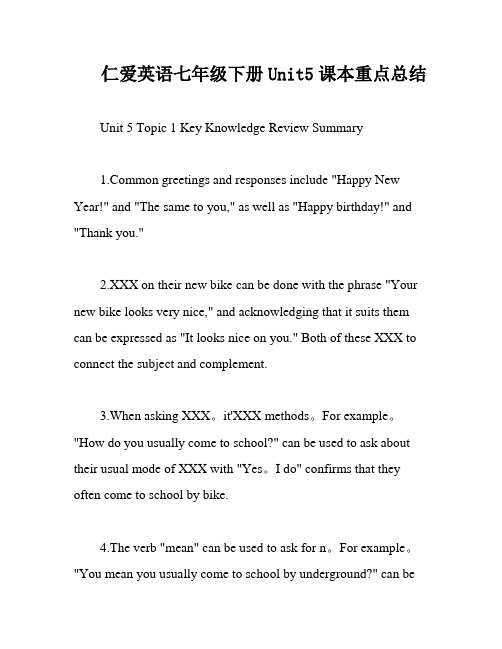
仁爱英语七年级下册Unit5课本重点总结Unit 5 Topic 1 Key Knowledge Review Summarymon greetings and responses include "Happy New Year!" and "The same to you," as well as "Happy birthday!" and "Thank you."2.XXX on their new bike can be done with the phrase "Your new bike looks very nice," and acknowledging that it suits them can be expressed as "It looks nice on you." Both of these XXX to connect the subject and complement.3.When asking XXX。
it'XXX methods。
For example。
"How do you usually come to school?" can be used to ask about their usual mode of XXX with "Yes。
I do" confirms that they often come to school by bike.4.The verb "mean" can be used to ask for n。
For example。
"You mean you usually come to school by underground?" can beused to XXX。
仁爱版七年级下册Unit5知识点总结
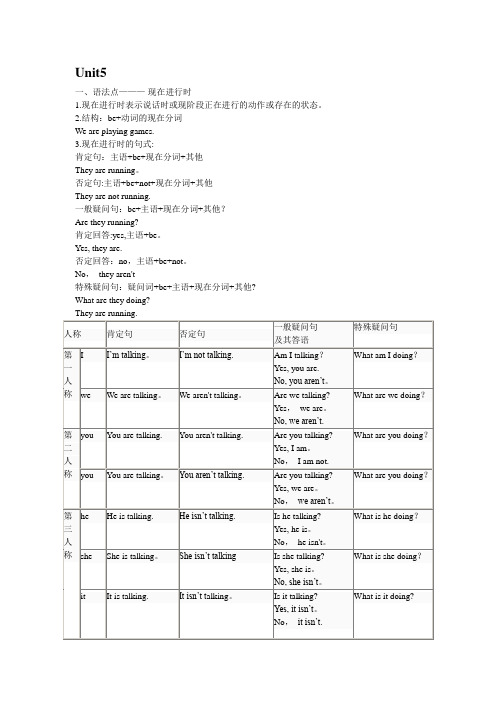
Unit5一、语法点———-现在进行时1.现在进行时表示说话时或现阶段正在进行的动作或存在的状态。
2.结构:be+动词的现在分词We are playing games.3.现在进行时的句式:肯定句:主语+be+现在分词+其他They are running。
否定句:主语+be+not+现在分词+其他They are not running.一般疑问句:be+主语+现在分词+其他?Are they running?肯定回答:yes,主语+be。
Yes, they are.否定回答:no,主语+be+not。
No,they aren't特殊疑问句:疑问词+be+主语+现在分词+其他?What are they doing?4.动词现在分词构成:&&正常变化是在动词原型后加ing 如:read—-—-reading ;drink-—-drinking ;eat—-—eating ;&&以e结尾的动词,去掉e再加ing 如:write -——writing ;make-—— making ; ride---riding ;&&重读闭音节( 只有一个元音字母,而其后跟有一个辅音字母时)要双写结尾的辅音字母再加ingsit--—sitting ; swim-—swimming ; put-—-putting ; run—running&&以ie结尾的动词—ie+y+ing:lie -- lying die --— dying&&以y结尾的动词变成现在分词是,y不变,直接加上-ing总结一添一去y不变5.标志词:可用来表示现在进行时的时间状语,常用的有:now, this week, at this moment 等;或者告诉你一个准确的现在时间,或者用look, listen提醒听者注意正在发生的事。
e.g.: They are playing basketball now。
七年级仁爱英语下unit5知识点
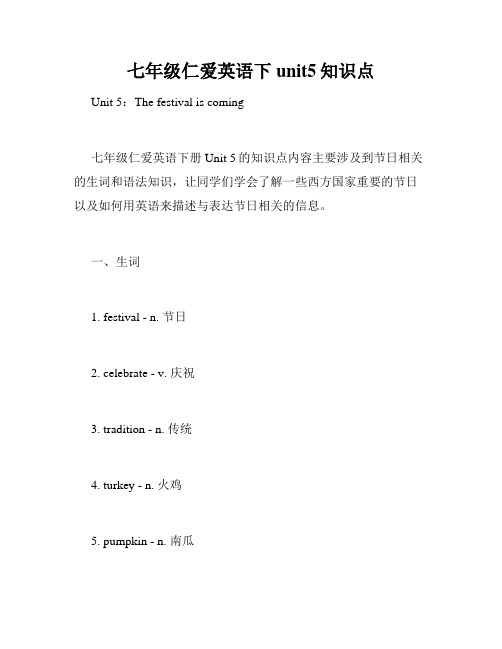
七年级仁爱英语下unit5知识点Unit 5:The festival is coming七年级仁爱英语下册Unit 5的知识点内容主要涉及到节日相关的生词和语法知识,让同学们学会了解一些西方国家重要的节日以及如何用英语来描述与表达节日相关的信息。
一、生词1. festival - n. 节日2. celebrate - v. 庆祝3. tradition - n. 传统4. turkey - n. 火鸡5. pumpkin - n. 南瓜6. costume - n. 服装7. mask - n. 面具8. fireworks - n. 烟火9. parade - n. 游行二、语法1. 报时:It’s + 时间例如:It’s 8 o’clock. (现在是8点。
)2. 肯定句和否定句:肯定句:主语 + 动词 + 宾语否定句:主语+ don’t/doesn’t + 动词 + 宾语例如:He eats pizza.(他吃比萨饼。
)He doesn’t eat hamburgers.(他不吃汉堡包。
)3. 描述现在正在进行的动作:主语 + am/is/are + doing例如:I am reading a book.(我正在看书。
)4. 被动语态:主语 + am/is/are + 被动语态 + (by + 发出者)例如:The book is read by me.(这本书被我读了。
)练习:1. 用英语报时,现在是9点。
答案:It’s 9 o’clock.2. 用英语描述正在做的事情,我正在看电视。
答案:I am watching TV.3. 将句子“我喜欢吃汉堡包。
”改为否定句。
答案:I don’t like eating hamburgers.4. 将句子“他吃饭。
”改为被动语态。
答案:The food is eaten by him.三、节日1. Christmas(圣诞节)时间:每年的12月25日庆祝方式:互赠礼物、吃圣诞大餐、圣诞树等英语表达:It’s Christmas. (现在是圣诞节。
完整版)仁爱版英语七年级下册各单元知识点归纳

完整版)仁爱版英语七年级下册各单元知识点归纳Unit 5 Topic 1Key grammar: Simple Present Tense (often used with adverbs of frequency such as never。
seldom。
sometimes。
often。
usually。
always)Key XXX:How do you usually come to school?I usually come to school by subway.How often do you go to the library?XXX/Three times a week/Very often/Every day/SeldomXXX:1.I always come to school by bus.Use "by" before the name of the XXX。
without using any determiners in een。
If there are determiners such as "a"。
"the"。
"my"。
etc。
before the means of XXX。
"in" or "on" should be used instead.Examples: on the train = by train。
on his bike = by bike。
in my car = by car。
Differences een "on foot" and "walk on foot": "on foot" is a nal phrase that cannot be used as a predicate but only as an adverb of manner at the end of a sentence。
仁爱版英语七年级下册 第五单元 知识点汇总
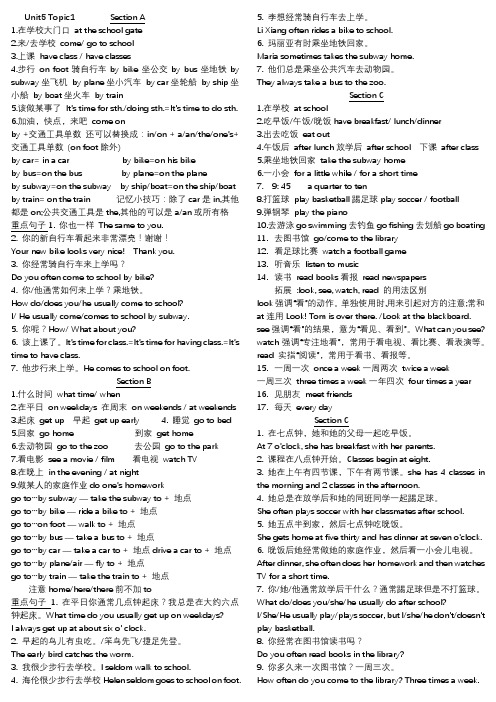
Unit5 Topic1Section A1.在学校大门口at the school gate2.来/去学校come/ go to school3.上课have class / have classes4.步行on foot骑自行车by bike坐公交by bus坐地铁by subway坐飞机by plane坐小汽车by car坐轮船by ship坐小船by boat坐火车by train5.该做某事了It’s time for sth./doing sth.=It’s time to do sth.6.加油,快点,来吧come onby +交通工具单数还可以替换成:in/on + a/an/the/one’s+交通工具单数(on foot除外)by car= in a car by bike=on his bikeby bus=on the bus by plane=on the planeby subway=on the subway by ship/boat=on the ship/boat by train= on the train 记忆小技巧:除了car是in,其他都是on;公共交通工具是the,其他的可以是a/an或所有格重点句子1. 你也一样The same to you.2. 你的新自行车看起来非常漂亮!谢谢!Your new bike looks very nice! Thank you.3. 你经常骑自行车来上学吗?Do you often come to school by bike?4. 你/他通常如何来上学?乘地铁。
How do/does you/he usually come to school?I/ He usually come/comes to school by subway.5. 你呢?How/ What about you?6. 该上课了。
It’s time for class.=It’s time for having class.=It’s time to have class.7. 他步行来上学。
仁爱英语七下U5T1知识点梳理

仁爱版英语七下U5T1知识点梳理Unit1 I usually come to school by subway一、重点单词详解1.gateLet’s meet at our school gate.2.交通工具词:bus/car/train/subway/plane/ship/boat3.频度副词:always,usually,often,sometimes,seldom,never句中位置:位于系动词be、助动词、情态动词(can, may, must等)之后,实义动词前。
例如:He is always kind to others.He often helps his classmates with their English.有时为了表示强调,也可放在句首或句末Sometimes I go to the park on foot.易混词sometimes有时候,sometime某时候Sometimes walking is even faster than driving during the busy traffic time.在交通高峰期,有时候走路甚至比开车还快。
Good luck and hope to see you again sometime soon!祝你好运,希望不久能见到你。
3.earlyIn the early mornings,we often go jogging in the park.清晨,我们经常去公园慢跑。
You should get up early to do sports.你应该早点起床做运动。
4.catchThe early bird catches the worm.I threw the ball to Machael and he caught it .我把球投给Michael,他接住了。
He can’t come to school because he catches a bad cold. 他不能来学校因为他得重感冒了。
仁爱版七年级英语下册Unit5单元知识点整理总结

仁爱版七年级英语下册Unit5单元知识点整理总结仁爱版七年级英语下册Unit 5知识点总结Unit 5Topic 1㈠短语总结1.在学校大门口at the school gate2.来学校come to school3.去学校go to school4.上课have class / have classes5.步行on foot6.骑自行车ride a bike/ ride bikes/ by bike / on a bike7.坐公交by bus / take a bus8.坐地铁by subway / take the subway / on the subway9.坐飞机by plane/ take the plane / on the plane10.坐小汽车by car / in a car/ take a car/ drive a car11.坐轮船by ship12.坐小船by boat13.坐火车by train / on the train14.在我们组in our group15.一群学生a group of students16.我们中的三个人three of us17.在通常on weekdays18.在周末on the weekends / at weekends19.起床get up20.睡觉go to bed21.夙起get up early22.回家go home23.到家get home24.去动物园go to the zoo25.去公园go to the park26.看电影see a movie / film27.看电视watch TV28.在早晨in the evening / at night29.帮助父母help parents30.做或人的家庭功课do one’s ( my/ her/ his/ your/ their)homework131.在学校at school32.知道,了解know about / learn about33.校园生活school life34.一个美国粹生an American student35.在美国in America / in the U.S.A.36.许多学生many students/ a lot of students/ lots of students37.很少very few38.吃午饭have lunch39.进来用饭eat out40.在校期间on school days41.休息一会have a short rest/ break42.午餐后after lunch43.在某人的业余时间in one’s ( my/ his/ her/ their…)free/ spare time44.打篮球play basketball45.踢足球play soccer / football46.弹钢琴play the piano47.弹吉他play the guitar48.拉二胡play erhu49.去泅水go swimming / go for a swim50.去划船go boating51.球赛a ball game / ball games52.一年四次four times a year53.听音乐listen to music54.读书read books55.看报read newspapers56.看医生see a doctor57.去图书馆go to the library58.一周两次twice a week59.见朋友meet friends60.天天every day61.在七点半at half past seven62.一小会for a little while / for a short time63.晚饭后after supper64.用饭have dinner265.吃早餐have breakfast㈡重要句型1. I usually come to school by subway.同义句: I usually take the subway to school.对划线部分提问: How do you usually come to school? 类似的有:go to school by bike=go to schoolon a bike= ride a bike to school=ride to schoolgo home by bus=go home on a bus=take a bus home2. How do you usually/ often…?你通常/经常怎样…?3. It’s time for class.=It’s time to have class. =It’s time for having class.4. What about you? =How about you?5.Howoften…?讯问频次,回覆能够用频次副词:always,usually,often,sometimes, seldom, never, every day ,every +其他工夫名词或透露表现频次的短语回覆透露表现频次的短语:次数+单元工夫e.g. : once a day / twice a week / three times a month6. The early bird catches the worm. (谚语)笨鸟先飞7. Work / Study must come first.事情/进修必需放在第一名!8. Classes begin at eight. =Class begins at eight.提问:What time does the class begin? / What time do the classes begin?㈢重要单词的用法1. by后面直接加表示交通工具的名词,中间不用任何词修饰,如:by bike2.本话题涉及的时态为一般现在时,句中常有频率副词或表示频率的短语,如果主语为三单,动词一定要用三单!3Unit5 Topic2(一)重要单词:1. borrowMay I borrow your eraser?2. keep表示借一段时间,后常跟上一段时间e.g You may keep this book for two weeks.3. find和look forfind :找到,发觉,夸大结果look for寻觅,夸大进程e.g I’m looking for my shoese verywhere, but I can not find it.4.also与too 两个都表是“也”的意义, also用在句中, too用在句末 e.g Helen is also a student.I have long hair and she has long hair, too.(二)短语总结:1. on time定时2. in time实时3 .in the center of:在…..中央4 .next to在什么隔壁,在什么旁边5. at the back of ;在….后面(外部后面)6. in front of….在…..前面(外部后面)7. behind在…..后面(内部后面)8. in the front of在….前面(内部后面)9 .on the left在左边10. on the right在右边11. Show sb around领某人参观12. between…and…在….与….之间13. from….to…从…..到…..14. On the shelf在架子上shelf复数形式是shelves15. do better in sth/doing sth在……方面做的更好do well in sth/doing sth在…..做得好be good at sth/doing sth在…..方面善于16. at the moment现在,此刻17. play computer games玩电脑游戏418. a few几个19. the Great Wall长城(三)重要句型总结1. What’s in+sth透露表现那里有甚么工具(四)语法:现在进行时(1) .目前举行时透露表现正在产生或举行的举措,可与now,atthemoment等工夫状语连用。
仁爱版七年级英语下册UNIT5 知识点

仁爱版七年级英语下册UNIT5 知识点本文将为大家介绍仁爱版七年级英语下册UNIT5的知识点,希望能帮助大家更好地学习英语。
一、单词1. beach(n.)海滩2. sea(n.)海洋,海3. swim(v.)游泳4. sail(v.)航行5. island(n.)岛屿6. sun(n.)太阳7. sand(n.)沙子8. shell(n.)贝壳9. wave(n.)海浪10. wind(n.)风11. plane(n.)飞机12. sky(n.)天空13. cloud(n.)云14. weather(n.)天气15. hot(adj.)热的16. cold(adj.)冷的17. windy(adj.)多风的18. rainy(adj.)多雨的19. snowy(adj.)多雪的20. foggy(adj.)多雾的二、句型1. How is the weather? 天气怎么样?2. It’s sunny. 天晴。
3. It’s rainy. 多雨。
4. It’s windy. 多风。
5. The wind is blowing. 风在刮。
6. I like swimming in the sea. 我喜欢在海里游泳。
7. We can see some shells on the beach. 我们在海滩上可以看到一些贝壳。
8. Let’s sail to the island. 让我们航行到那个岛屿。
9. The plane is flying in the sky. 飞机在天空中飞行。
10. The weather is getting hotter and hotter. 天气越来越热了。
三、语法现在进行时现在进行时表示正在进行的动作或者事情,用于描述当前正在发生的事情。
构成:be动词(am, is, are)+动词的ing形式。
例句:1. She is swimming in the sea. 她正在海里游泳。
仁爱版七年级英语下册Unit5知识点总结

仁爱版七年级英语下册Unit5知识点总结七年级英语下册Unit 5 知识点总结⼀、短语Unit 5 Topic1(⼀)短语总结1. 在学校⼤门⼝at the school gate2. 来学校come to school3. 去学校go to school4. 上课have class / have classes xK b1.C o m5. 步⾏on foot6. 骑⾃⾏车ride a bike/ ride bikes/ by bike / on a bike7. 坐公交by bus / take a bus8. 坐地铁by subway / take the subway / on the subway9. 坐飞机by plane/ take the plane / on the plane10. 坐⼩汽车by car / in a car/ take a car/ drive a car11. 坐轮船by ship12. 坐⼩船by boat13. 坐⽕车by train / on the train14. 在我们组in our group15. ⼀群学⽣ a group of students16. 我们中的三个⼈three of us17. 在平⽇on weekdays18. 在周末on the weekends / at weekends19. 起床get up20. 睡觉go to bed21. 早起get up early22. 回家go home23. 到家get home24. 去动物园go to the zoo25. 去公园go to the park26. 看电影see a movie / film27. 看电视watch TV28. 在晚上in the evening / at night29. 帮助⽗母help parents30. 做某⼈的家庭作业do one’s ( my/ her/ his/ your/ their)homework31. 在学校at school32. 知道,了解know about / learn about33. 校园⽣活school life34. ⼀个美国学⽣an American student35. 在美国in America / in the U.S.A.36. 许多学⽣many students/ a lot of students/ lots of students37. 很少very few38. 吃午饭have lunch39. 出去吃饭eat out40. 在校期间on school days41. 休息⼀会have a short rest/ break42. 午饭后after lunch43. 在某⼈的业余时间in one’s ( my/ his/ her/ their…)free/ spare time44. 打篮球play basketball45. 踢⾜球play soccer / football46. 弹钢琴play the piano47. 弹吉他play the guitar48. 拉⼆胡play erhu49. 去游泳go swimming / go for a swim50. 去划船go boating51. 球赛 a ball game / ball games52. ⼀年四次four times a year53. 听⾳乐listen to music54. 读书read books55. 看报read newspapers56. 看医⽣see a doctor57. 去图书馆go to the library58. ⼀周两次twice a week59. 见朋友meet friends60. 每天every day61. 在七点半at half past seven62. ⼀⼩会for a little while / for a short time63. 晚饭后after supper64. 吃饭have dinner65. 吃早饭have breakfast(⼆)重点短语1.on foot步⾏go …on foot = walk ( to )…2.at the school gate在学校⼤门⼝3.on weekdays在平⽇,在⼯作⽇4.on weekends=on the weekend在周末5.after school放学后6.after class下课后7.after breakfast / lunch / supper早餐/ 午餐 / 晚餐后8.in one's free time在某⼈空闲时间9.have a rest休息⼀下10.read books读书11.go swimming去游泳12.listen to music听⾳乐13.watch TV看电视14.do(one’s) homework 做作业15.go to the zoo / park去动物园/ 公园16.once a week ⼀周⼀次17.every day 每天18.have classes 上课19.for a little while ⼀会⼉20.go to bed 上床睡觉/doc/ace5cca9571810a6f524ccbff121dd36a22dc47e.html e on 快点,加油,来吧22.get up 起床23.talk with / to sb.与某⼈谈话24.at school 在学校、在上课25.go to school 去上学26.and so on ……等等Unit 5 Topic2(⼀)单词与短语总结(1) 重要单词:1. borrow:指主语借⼊borrow sth. from sb.e.g You can borrow this book from the library.May I borrow your eraser?lend: 指主语借出lend sth. to sb. / lend sb. sth.e.g Can you lend your car to me?They often lend us their ball.2. keepkeep 和borrow, lend 的意思⼀样,都是表⽰借的意思, 区别是borrow和lend是瞬间动词,⽽keep是延续性动词,表⽰借⼀段时间,后常跟上⼀段时间e.g You may keep this book for two weeks.借进borrow 借出lend 借多久keep3. find和look forfind :找到,发现,强调结果look for寻找,强调过程e.g I’m looking for my shoese verywhere, but I can not find it.4. returnreturn :归还=give back return sth to sb=give sth back to sbe.g Please return this book to Steve=please give back this book to Steve.e.g He will return from America next month.5. on time: 准时,强调不早不迟到达in time: 及时,强调在规定的时间以前到达e.g We must go to work on time. The students can get there in time.6. Japanese: adj ⽇本的,⽇本⼈的,⽇语的n.⽇本⼈,⽇语当Japanese表⽰⽇本⼈时,是可数名词,单复数同形(与Chinese⽤法相同)e.g Two Japanese and three Chinese are swimming in the swimming pool.7. also 与too两个都表是“也”的意思, also⽤在句中, too⽤在句末e.g Helen is also a student.I have long hair and she has long hair, too.8 plan n.平⾯图v.计划plan to do sth(2)短语总结:1. on time 准时2. in time 及时3 .in the center of: 在…..中央4 .next to 在什么隔壁,在什么旁边5. at the back of ; 在….后⾯(外部后⾯)6. in front of….在…..前⾯(外部后⾯)7. behind 在…..后⾯(内部后⾯)8. in the front of 在….前⾯(内部后⾯)9 .on the left 在左边10. on the right 在右边11. Show sb around 领某⼈参观12. between …and…在….与….之间13. from ….to…从…..到…..14. On the shelf 在架⼦上shelf复数形式是shelves15. do better in sth/doing sth 在……⽅⾯做的更好do well in sth/doing sth 在…..做得好be good at sth/doing sth 在…..⽅⾯擅长16. at the moment 现在,此刻17. play computer games 玩电脑游戏18. a few ⼏个19. the Great Wall 长城(⼆)重点短语:1. make cards 制作卡⽚2. on the playground 在操场上3. in the library 在图书馆4. in the gym在体育馆5. on the shelf在书架上(shelves 复数)6. at the Lost and Found在失物招领处7.clean the room打扫房间8.have a soccer game举⾏⾜球⽐赛9. have an English class上英语课10. write a letter 写信11. some of his photos= some photos of his他的⼀些照⽚Unit 5 Topic3(⼀))重点单词Today, Wednesday, Monday, Tuesday, geogrophy, Thursday, Friday, art, history, math, science, meeting, activity, lesson, draw, learn, interesting, difficult, boring ,which, subject, best, other, friendly, February, newspaper, hard, wish, story. (⼆)重点短语1.Have a music class.上⾳乐课2.at ten o’clock 在⼗点钟3.be over (=finish) 结束4.on+星期名词在星期⼏5.outdoor activities 户外活动6.work on 致⼒于,专⼼于7. learn about the past 了解历史8.it’s time for …该⼲…了9.be friendly to 对…友好10. play with sb 和某⼈玩耍Play with sth玩弄某物11.swim in the swimming pool 在游泳池游泳12.draw pictures 画画14. every Tuesday and Thursday 每周⼆和周四15.tell sb sth=tell sth to sb 把某事告诉某⼈16. school newspaper 校报17.and so on 等等18. learn sth from 从…学到…19. hard work ⾟勤⼯作20. thank sb for sth/ thank sb. for doing sth因某事⽽感谢某⼈21. run on the playground 在操场跑步22. watch animals看动物23. play soccer at school 在学校踢⾜球24. read a book at home 在家看书25.have dinner in the school dinning hall 在学校餐厅吃饭(三)重点短语:1. outdoor activity 课外活动2. easy and interesting 容易⼜有趣3. difficult and boring ⼜难⼜乏味4. be friendly to sb. =be kind to sb.对某⼈友好5.between…and…在……之间…6. learn(…)from…向…学习…/从…中学…7.learn about the past了解过去8.learn about了解9.learn by oneself⾃学7. from…to…从……到……8. in the morning / afternoon / evening在早上/ 下午/ 晚上9.on Monday 在星期⼀10.on Monday morning在星期⼀的早上11. tell sb. about sth告诉某⼈关于某事⼆、句型Unit 5 Topic1重点句型总结(1)1. I usually come to school by subway.同义句: I usually take the subway to school.对划线部分提问: How do you usually come to school?类似的有:go to school by bike=go to schoolon a bike= ride a bike to school=ride to schoolgo home by bus=go home on a bus=take a bus home2. How do you usually/ often…?你通常/经常怎样…?3. It’s time for class.=It’s time to have class. =It’s time for having class.4. What about you? =How about you?5. How often …? 询问频率,回答可以⽤频率副词:always, usually, often, sometimes, seldom, never, every day ,every +其他时间名词或表⽰频率的短语回答表⽰频率的短语:次数+单位时间e.g. : once a day / twice a week / three times a month6. The early bird catches the work. (谚语) 笨鸟先飞7. Work / Study must come first. ⼯作/ 学习必须放在第⼀位!8. Classes begin at eight. =Class begins at eight.提问:What time does the class begin? / What time do the classes begin?重要单词的⽤法1. look (感官动词) 看起来,后⾯加形容词His mother looks very young.They look very cute.Her dress looks very nice.You look very cool in this coat.2. by 介词by 后⾯直接加表⽰交通⼯具的名词,中间不⽤任何词修饰,如:by bikeby +动词ing形式,表⽰通过某种⽅式People show love to their mothers by giving cards.You can be a good student by working hard.3. over (形容词)School / Class is over.4. begin现在分词: beginning 过去式: beganbegin to do sth , begin doing sthHe begins to write a letter. =He begins writing a letter.如果begin本⾝为分词,只能⽤begin to do sthHe is beginning to run.5. listen to 听(动作) ,hear 听见(结果)6. always 反义词never7. 本话题涉及的时态为⼀般现在时,句中常有频率副词或表⽰频率的短语。
七年级下册仁爱英语第五单元知识要点
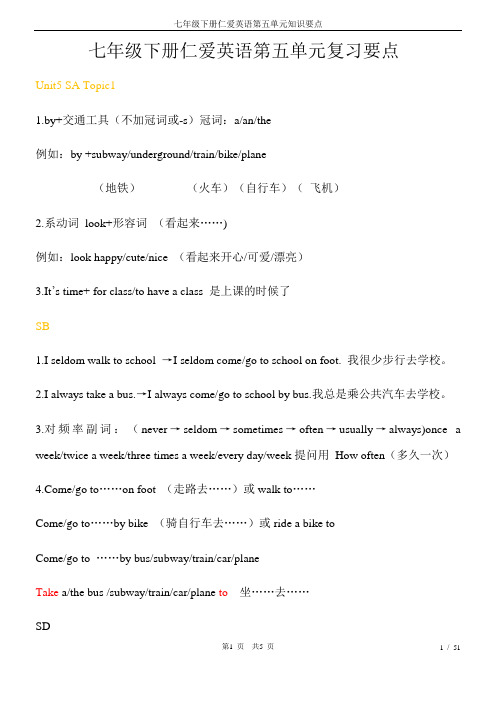
七年级下册仁爱英语第五单元复习要点Unit5 SA Topic11.by+交通工具(不加冠词或-s)冠词:a/an/the例如:by +subway/underground/train/bike/plane(地铁)(火车)(自行车)(飞机)2.系动词look+形容词(看起来……)例如:look happy/cute/nice (看起来开心/可爱/漂亮)3.It’s time+ for class/to have a class 是上课的时候了SB1.I seldom walk to school →I seldom come/go to school on foot. 我很少步行去学校。
2.I always take a bus.→I always come/go to school by bus.我总是乘公共汽车去学校。
3.对频率副词:(never→seldom→sometimes→often→usually→always)once a week/twice a week/three times a week/every day/week提问用How often(多久一次)e/go to……on foot (走路去……)或walk to……Come/go to……by bike (骑自行车去……)或ride a bike toCome/go to ……by bus/subway/train/car/planeTake a/the bus /subway/train/car/plane to 坐……去……SD1.know about sb./sth.了解某人/某事2.The school life of American students 美国学生的学习生活3.At school 在学校4.Be over 结束school is over 放学了5.In one’s free time 在某人业余时间6.Have no/(not any) more time 没有更多的时间7.Talk to/with sb.和某人交谈T2 SA1.现在进行时①概念:表示现在进行或发生的动作也可表示当前一段时间内的活动或现阶段正进行的动作②构成:主语+be+V.-ing③现在分词变换I直接加ing II去e加ing III双写加ing④常与now,at the moment ,listen,look连用形式肯定句:主语+be+V.ing+……否定句:主语+be not +V.ing+……一般疑问句:Be+主语+V.ing+……?Yes.主语+be/No.主语+be not特殊疑问句:what+be+主+doing+……?SB1.borrow sth. (from sb.)向某人借某物May I borrow your bike.我可以借你的自行车吗?2.look for sb./sth.寻找某人/某物He is looking for his wallet.他在寻找他的钱包Look for 寻找(强调过程)Find 找到(强调结果)How 怎么样对交通方式提问或对某事物的看法How often 多久一次对频率的提问How long 多久对一段时间的提问Borrow 借(动作)Keep 保存(一段时间)状态How long can I keep it? A day.SC1.show sb. around 带某人到处看看2.A few +可数名词复数一些几个 a few students/friends3.Have a soccer game 举行足球比赛4.Have lesson/classes 上课5.At the back of the classroom 在教室的后面(内部)6.Clean the blackboard 檫黑板7.Read English newspapers 看英文报纸A few +可数名词复数 a little + 不可数名词一些=someT3 SA1.what day is it today? 今天星期几?It's Friday. 星期五2.Why?Because we have a music class on Wednesday.SB1.You must return them on time.你必须按时归还他们。
仁爱英语七年级下册U5知识点汇总

仁爱英语七年级下册U5知识点汇总重点短语1. on foot go …on foot = walk ( to )…2. at the school gate在学校大门口3. on weekdays 在平日 ,在工作日4. on weekends=on the weekend在周末5. after school 放学后6. after class 下课后7. after breakfast / lunch / supper早餐/ 午餐/ 晚餐后8. in ones free time在某人空闲时间9. have a rest 休息一下10. read books 读书11. go swimming 去游泳12. listen to music 听音乐13. watch TV 看电视14. do〔one’s〕homework 做作业15. go to the zoo / park 去动物园/ 公园16. once a week 一周一次17. every day 每天18. have classes 上课19. for a little while 一会儿20. go to bed 上床睡觉21. come on 快点,加油,来吧22. get up 起床23. talk with / to sb.与某人谈话24. at school 在学校、在上课25. go to school 去上学26. and so on ……等等重点句型1. Happy New Year! The same to you.2. Your new bike looks very nice. Thank you.3. How do you usually come to school? —I usually come to school by subway.4. How often do you go to the library?5. —Once/Twice/Three times a week/Very often/Every day/Sedom6. The early bird catches the work. (谚语) 笨鸟先飞7. Work / Study must come first. 工作/ 学习必须放在第一位!8. Classes begin at eight. =Class begins at eight.9. What time does the class begin? / What time do the classes begin?10. We have no more time. 我们没有更多的时间了。
- 1、下载文档前请自行甄别文档内容的完整性,平台不提供额外的编辑、内容补充、找答案等附加服务。
- 2、"仅部分预览"的文档,不可在线预览部分如存在完整性等问题,可反馈申请退款(可完整预览的文档不适用该条件!)。
- 3、如文档侵犯您的权益,请联系客服反馈,我们会尽快为您处理(人工客服工作时间:9:00-18:30)。
仁爱英语七年级下册U5知识点汇总重点短语1. on foot go …on foot = walk ( to ) …2. at the school gate 在学校大门口3. on weekdays在平日,在工作日4. on weekends=on the weekend 在周末5. after school 放学后6. after class 下课后7. after breakfast / lunch / supper早餐/午餐/晚餐后8. in ones free time 在某人空闲时间9. have a rest 休息一下10. read books 读书11. go swimmi ng 去游泳12. listen to music 听音乐13. watch TV 看电视14. do (one ' )s homework 做作业15. go to the zoo / park 去动物园/ 公园16. once a week 一周一次17. every day 每天18. have classes 上课19. for a little while 一会儿20. go to bed上床睡觉21. come on快点,加油,来吧22. get up 起床23. talk with / to sb.与某人谈话24. at school在学校、在上课25. go to school 去上学26. and so on..... 等等重点句型1. Happy New Year! The same to you.2. Your new bike looks very nice. Thank you.3. How do you usually come to school? —I usually come to school by subway.4. How ofte n do you go to the library?5. —On ce/Twice/Three times a week/Very ofte n/Every day/Sedom6. The early bird catches the work.(谚语)笨鸟先飞7. Work / Study must come first.工作/学习必须放在第一位!8. Classes begi n at eight. =Class begi ns at eight.9. What time does the class begi n? / What time do the classes beg in?10. We have no more time.我们没有更多的时间了。
11. I have four classes in the morning and two in the afternoon.我早上上四节课,下午上两节。
12. She goes to bed at about a quarter to ten.她九点四十五分睡觉。
重点详解1. by+交通工具,表示使用某种交通方式,中间不加限定词,如果交通工具前有a, the, my等限定词,就不能用by,而是用in或是on. by +动词ing形式,表示通过某种方式乘坐交通工具/、by + 交通工具(by car/bus/tra in /ship )take the+交通工具(take the bus/car)on+大型圭寸闭式工具(on the bus/ train/ship/pla ne )on the train=by trainon his bike=by bike on a bike/motorbikein +小型圭寸闭交通工具(in a car/taxi)in my car=by carI always come to school by bus.People show love to their mothers by givi ng cards.You can be a good stude nt by work ing hard.巧辩异同on foot与walk on foot走路”是介词短语,不能作谓语,只作方式状语,位于句末。
walk走路"是动词,可以作谓语。
take the bus = go …by bus ride a bike = go …by biketake the subway = go …by subwaygo to …on foot= walk to I often go to school on foot. =I often walk to school.go to •….by bike = ride a bike go to •….by car = drive a car togo to … by plane = fly to go to … by bus = take a bus to2. It ' s time for sth该做某事了’ ”=It ' s time to do sth.It ' s time for class. =It ' s time to have class. =It ' s time for having class.3. look +adj (look感官动词,系动词)看起来His mother looks very young.They look very cute.Her dress looks very nice.You look very cool in this coat.look的短语look the same 看起来一样look like看起来像....look for 寻找look after =take care of 照顾,照料look arou nd/about 四处看看,四下环顾;look back回头看;回顾;look out当心,小心,留神;look through浏览,仔细查看;一|look up查寻,查阅;抬头看4. do one ' s homewo做家庭作业(注:one '要随主语的变化而变化,常用形容词性物主代词my, your, their, our, his, her 等)。
do my homework at school 在学校做作业5. want to do sth.想做某事” want后接动词不定式作宾语。
know about 了解,知道关于…”we want to know about the school life of America n stude nts.我们想了解一下美国学生的学校生活。
6. 巧辩异同a few+可数名词(肯定);一点,一些;few+可数名词:(否定)很少,几乎没有a little+不可数名词(肯定);一点,一些;little +不可数名词:(否定)很少,几乎little和few作形容词用,都表示几乎没有”强调少;a little和a few强调有一些。
e.g.He has a few frien ds.他有几个朋友。
He has few frie nds.他几乎没有朋友。
e.g. I can speak only a little Chin ese.They has little mo ney.他们没有什麽钱a little与little也可以用作副词,表示有点”稍稍”表示很少”e.g. Can you speak En glish? ---Yes, but only a little.This book is a little more difficult than that one. (可修饰形容词比较级)She slept little last night.昨天晚上,她没有怎么睡觉。
7. go+v.-ing表示去做某事,类似:go fish ing去钓鱼go shoppi ng去买东西go boati ng 去划船go skat ing 去滑冰go swim ming 去游泳|and so on等等”,表示还有很多。
They often play basketball or coccer, go swim ming and so on.8. (1). How often多久一次(对频度进行提问)|答语常用频度副词always〉usually>often> sometimes>seldom>never 等或单位时间内的次数,表示频率的短语:次数+单位时间e.g. : once a week 一周一次twice a month 每月两次three times a year 每年三次How ofte n do you go to the library?你多久去一次图书馆?--on ce/twice/three times/four times a week/ mon th/year(2).How far 多远(表示距离)How far is it from here to the zoo? --It ' s 6 kilometers.(3) .How long多长(对时间进行提问,持续多长时间(多久)/东西的长度(多长)How long did he stay here? About two weeks.How long is the river? About 500 km.(4).How soon再过多久,主要用来表示对将来一段时间的提问。
常用“in时间段”来回答。
How soon will he be back? In an hour.9. over (形容词) School / Class is over. What time is the class over?10. begi n 现在分词:beg inning 过去式:bega n What time does the class beg in?begi n to do sth beg in doing sthHe beg ins to write a letter. =He beg ins writi ng a letter.女口果begin 本身为分词,只能用begin to do sth He is beginning to run.11. listen to听(动作),hear听见(纟吉果)冠词用法1. 弹乐器前要带定冠词the,而进行球类运动则不带the。
play + 棋类/ 球类/ 牌下... 棋,打 .. 球play soccer/basketballplay the +西洋乐器弹/拉••…乐器play the guitar/pia no2. 序数词,前面要用定冠词the。
